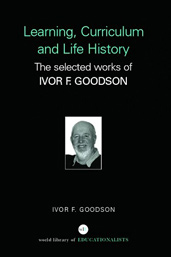Learning, Curriculum and Life Politics: the selected works of Ivor F. Goodson
Becoming a School Subject
The close connection between academic status and resources is a fundamental feature of our educational system. The origin of this connection is the examination system created by universities from the late 1850s and culminating in the school certificate system founded in 1917. As a result the so-called 'academic' subjects provide examinations which are suitable for 'able' students whilst other subjects are not.
Byrne's work has provided data on resource allocation within schools. She discerned that: 'two assumptions which might be questioned have been seen consistently to underlay educational planning and the consequent resource allocation for the more able children. First, that these necessarily need longer in school than non-grammar pupils, and secondly, that they necessarily need more staff, more highly paid staff and more money for equipment and books'. The implications of the preferential treatment of academic subjects for the material self-interest of teachers are clear: better staffing ratios, higher salaries, higher capitation allowances, more graded posts, better careers prospects. The link between academic status and resource allocation provides the major explanatory framework for understanding the aspirational imperative to become an academic subject. Basically since more resources are given to the academic examination subject taught to able students the conflict over the status of examinable knowledge is above all a battle over the material resources and career prospects of each subject teacher or subject community.
The historical profile tentatively discerned for geography exposes certain omissions, in some cases misconceptions, within the main philosophical and sociological accounts. The philosophical perspective has provided support for the view that school subjects derive from forms or fields of knowledge or 'disciplines'. Of course once a school subject has brought about the establishment of an academic discipline base it is persuasively self-fulfilling to argue that the school subject receives intellectual direction and inputs from university scholars. This version of events simply celebrates a fait accompli in the history of the school subject and associated disciplines. What is left unexplained and unrecorded are the stages of evolution towards the culminating pattern and the forces which push aspiring academic subjects to follow similar routes. By starting with the final historical product philosophical studies forego the opportunity to examine school subjects fully.
In a way, sociological accounts also celebrate the fait accompliand assume that university control of school subjects reflects a continuing pattern of pervasive domination. As we have seen the major agencies actively involved in constructing this pattern were the teachers of school subjects themselves - not so much domination by dominant forces, more solicitous surrender by subordinate groups. The stress on domination leads to an emphasis on teachers 'being socialized within institutionalized structures' which legitimate high status patterns of academic subjects. Far from this socialization in dominant institutions being the major factor creating the pattern we have examined, it was much more considerations of teachers' material self-interest in their working lives. Since the misconception is purveyed by sociologists who often exhort us 'to understand the teachers' real world' they should really know better. High status academic knowledge gains its adherents and aspirants less through control of the curricula which socialise than through re-established connection with patterns of resource allocation and the associated work and career prospects these ensure. The historical study of school subjects directs our attention to the development of patterns of resource allocation and I think shows how generative this approach might be in replacing crude notions of domination with patterns of control in which subordinate groups can be seen actively at work.
- Byrne, E.M. (1974) Planning and Educational Inequality, Slough: NFER, p. 29.
